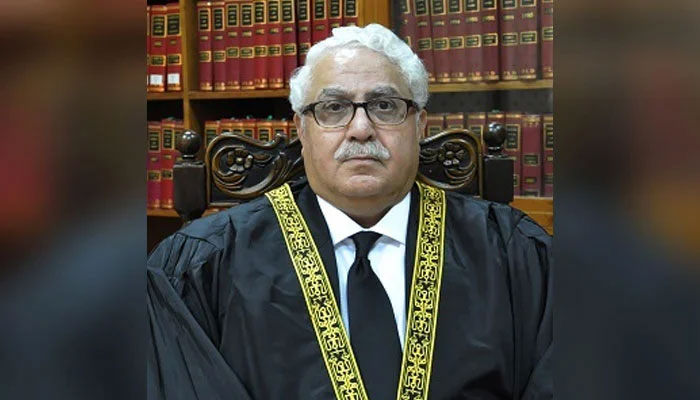SJC show-cause notice issued to SC judge again
Supreme Judicial Council issued a show-cause notice to judge Mazahar Ali Akber Naqvi again after three days of deliberations on the misconduct complaints filed against him
ISLAMABAD: The Supreme Judicial Council (SJC) on Wednesday issued a show-cause notice to Supreme Court judge Mazahar Ali Akber Naqvi again after three days of deliberations on the misconduct complaints filed against him.
The notice, issued with a majority of four to one, sought a clarification from Justice Naqvi on 10 points in 14 days, according to sources in the SJC.
Earlier, a show-cause notice was issued to Justice Naqvi by the judicial panel on October 27.
The SJC meeting, on the third consecutive day on Wednesday, was held under the chairmanship of Chief Justice of Pakistan (CJP) Qazi Faez Isa.
Justice Sardar Tariq Masood, Justice Ijazul Ahsan, Chief Justice of Lahore High Court Justice Amir Bhatti, and Chief Justice of Balochistan High Court Justice Naeem Afghan attended the meeting as members of the top judicial body.
During the lengthy sessions, complaints were thoroughly examined, and after assessing the content of the complaints, the council decided to proceed with the complaints, the source added.
Following the deliberations, it was resolved, with a majority of four to one, to issue a show-cause notice to Justice Mazahar Naqvi and to further enhance the proceedings of the SJC.
According to sources, Justice Ahsan dissented with the majority decision to issue a show-cause notice to the apex court judge.
Several misconduct complaints were filed against Justice Naqvi during the tenure of former chief justice Umar Ata Bandial. Justice (retd) Bandial had referred the matter to Justice Masood for examining it and giving his legal opinion.
Initially, the misconduct complaint against Justice Naqvi was filed with the SJC by a Lahore-based lawyer Muhammad Dawood. Later on, Pakistan Bar Council (PBC) Vice Chairman Haroon Rashid filed a misconduct complaint against the SC judge after an audio leak emerged purportedly featuring a conversation about fixation of former Punjab chief minister Pervaiz Elahi’s case before a particular bench or judge.
Earlier in April, Justice Isa and Justice Masood urged the-then CJP Bandial to convene the meeting of the SJC for consideration of misconduct complaints filed against Justice Naqvi. In a joint letter addressed to all members of the SJC, both the judges had said that they were “waiting for you to convene a meeting of the Council to consider the complaints and to ascertain whether there is a substance in the stated allegations; we must exonerate the respondent judge and fully restore his honour or else submit our report in terms of the Constitution”.
Both the senior judges said that written complaints were received, including from the PBC alleging misconduct and financial impropriety by Justice Naqvi.
On Monday, Justice Naqvi filed a petition in the Supreme Court, terming the malicious campaign and consequent complaints against him a direct and blatant attack on the independence of the judiciary.
The SC judge accused the SJC of subjecting him to a “media trial” which has further maligned and ridiculed him in the public eye.
Justice Naqvi’s plea challenged the show-cause notice issued to him by the judicial panel on October 27. “These are violative of and inconsistent with the right to access to justice guaranteed under Articles 4, 9 and 10A of the Constitution,” it read, adding that Justice Naqvi reserves the right to “urge further grounds and submit additional material in support thereof at the time of hearing”.
The Supreme Court judge, in this petition, mentioned that the complaints against him are “mala fide and non-est”.
“The proceedings of the SJC and the SCN are without jurisdiction, coram non judice and void ab initio. These are without lawful authority and of no legal effect,” the plea read.
-
 Pentagon Threatens To Cut Ties With Anthropic Over AI Safeguards Dispute
Pentagon Threatens To Cut Ties With Anthropic Over AI Safeguards Dispute -
 Meghan Markle's Father Shares Fresh Health Update
Meghan Markle's Father Shares Fresh Health Update -
 Travis Kelce Takes Hilarious Jab At Taylor Swift In Valentine’s Day Post
Travis Kelce Takes Hilarious Jab At Taylor Swift In Valentine’s Day Post -
 NASA Confirms Arrival Of SpaceX Crew-12 Astronauts At The International Space Station
NASA Confirms Arrival Of SpaceX Crew-12 Astronauts At The International Space Station -
 Can AI Bully Humans? Bot Publicly Criticises Engineer After Code Rejection
Can AI Bully Humans? Bot Publicly Criticises Engineer After Code Rejection -
 Search For Savannah Guthrie’s Abducted Mom Enters Unthinkable Phase
Search For Savannah Guthrie’s Abducted Mom Enters Unthinkable Phase -
 Imagine Dragons Star, Dan Reynolds Recalls 'frustrating' Diagnosis
Imagine Dragons Star, Dan Reynolds Recalls 'frustrating' Diagnosis -
 Steve Jobs Once Called Google Over Single Shade Of Yellow: Here’s Why
Steve Jobs Once Called Google Over Single Shade Of Yellow: Here’s Why -
 Barack Obama Addresses UFO Mystery: Aliens Are ‘real’ But Debunks Area 51 Conspiracy Theories
Barack Obama Addresses UFO Mystery: Aliens Are ‘real’ But Debunks Area 51 Conspiracy Theories -
 Selma Blair Explains Why Multiple Sclerosis 'isn't So Scary'
Selma Blair Explains Why Multiple Sclerosis 'isn't So Scary' -
 Will Smith Surprises Wife Jada Pinkett With Unusual Gift On Valentine's Day
Will Smith Surprises Wife Jada Pinkett With Unusual Gift On Valentine's Day -
 Shamed Andrew Has Paid Royal Favours With ‘national Scandal’
Shamed Andrew Has Paid Royal Favours With ‘national Scandal’ -
 Prince William Ticked Off By How Andrew ‘behaved With Staff’
Prince William Ticked Off By How Andrew ‘behaved With Staff’ -
 Prince William Questions Himself ‘what’s The Point’ After Saudi Trip
Prince William Questions Himself ‘what’s The Point’ After Saudi Trip -
 James Van Der Beek's Friends Helped Fund Ranch Purchase Before His Death At 48
James Van Der Beek's Friends Helped Fund Ranch Purchase Before His Death At 48 -
 King Charles ‘very Much’ Wants Andrew To Testify At US Congress
King Charles ‘very Much’ Wants Andrew To Testify At US Congress




